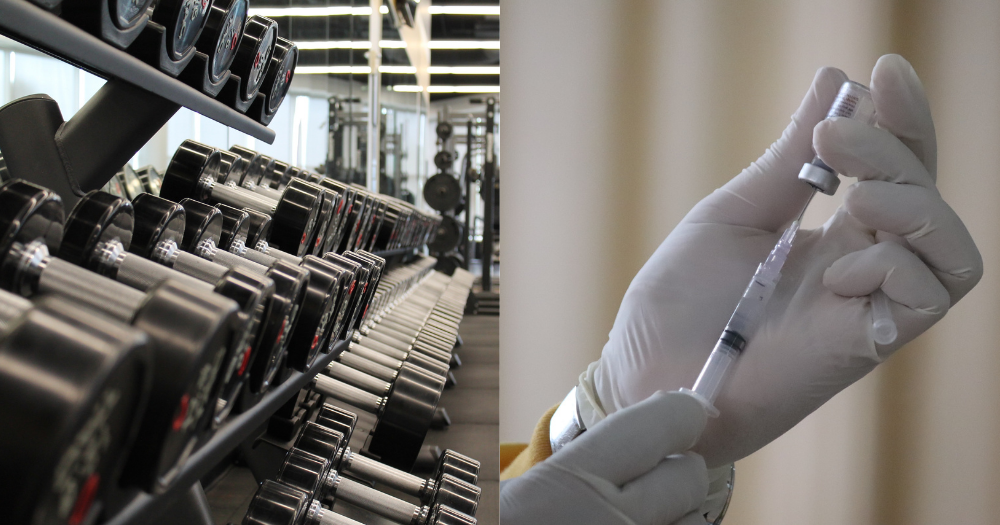Follow us on Telegram for the latest updates: https://t.me/mothershipsg
On Jul. 3, a 16-year-old Singaporean boy suffered a cardiac arrest which landed him in the intensive care unit (ICU), six days after receiving his first dose of the Covid-19 vaccine.
On Monday (Aug. 16), the Ministry of Health (MOH) shared more about the findings of medical investigations, and added that the teenager is recovering steadily.
Acute severe myocarditis likely arose from Covid-19 vaccine
In a press release on Monday, MOH announced that medical investigations found that the teenager had developed acute severe myocarditis (an inflammation of the heart muscle), which led to his cardiac arrest.
The ministry stated that the myocarditis was "likely a serious adverse event arising from the Covid-19 vaccine he received", adding that it might have been aggravated by the teenager's strenuous weightlifting and high consumption of caffeine through energy drinks and supplements.
On Jul. 7, MOH Director of Medical Services and associate professor Kenneth Mak said that the teenager had been taking supplements and lifting weights almost twice his body weight.
The Aug. 16 MOH statement acknowledged that there is a "small increased risk" of myocarditis and pericarditis (inflammation of the pericardium, or a sac surrounding the heart) after the administration of the vaccines.
However, the local incidence rate is low, with only 0.48 cases per 100,000 doses administered, according to ongoing pharmacovigilance monitoring by the Health Sciences Authority (HSA).
"The majority have responded well to treatment and have recovered or been discharged well from the hospital."
Making good progress on recovery
MOH added that the teenager is "recovering steadily and currently undergoing inpatient rehabilitation".
"He is making good progress and can perform his activities of daily living without assistance."
The teenager will likely be discharged in the coming weeks, but will likely need outpatient rehabilitation for some time, before he can return to school and resume other activities, the ministry said.
"The medical team will continue his treatment and monitor his condition."
MOH said that the teenager and his family have been offered a one-time financial assistance of S$225,000 under the Vaccine Injury Financial Assistance Programme (VIFAP).
According to the MOH website, the amount of VIFAP payout is dependent on the severity of the serious side effect.
The table indicates that the one-time payout of S$225,000 is available for serious side effects which result in death or permanent severe disability.
 Screenshot via MOH website.
Screenshot via MOH website.
The independent clinical panel that was appointed to assess and adjudicate the VIFAP application found that while the boy has made good improvement, he will require treatment and rehabilitation for some time to continue his recovery, because his condition was "severe and critical".
Avoid strenuous activity
The health ministry reminded all vaccine recipients — and adolescents and younger men in particular — to avoid strenuous physical activity for one week after each of their first and second doses of the Covid-19 vaccine, as a precaution.
Those who develop chest pain, shortness of breath, or abnormal heartbeats should also seek medical attention.
Anyone who develops myocarditis from their first dose of the mRNA Covid-19 vaccines should not receive any further doses of it, MOH said.
The ministry said that all eligible individuals, including adolescents and younger men, continue to be recommended to be vaccinated using the Pandemic Special Access Route (PSAR)-authorised mRNA Covid-19 vaccines deployed in Singapore's National Vaccination Programme (NVP).
This is because "the protective benefits from the mRNA Covid-19 vaccines continue to outweigh the risks of vaccination," it said.
MOH, the Expert Committee on Covid-19 Vaccination, and HSA will continue to closely monitor vaccine-related serious adverse events.
Photo via Danielle Cerullo and Mufid Majnun on Unsplash.
Follow and listen to our podcast here
If you like what you read, follow us on Facebook, Instagram, Twitter and Telegram to get the latest updates.
